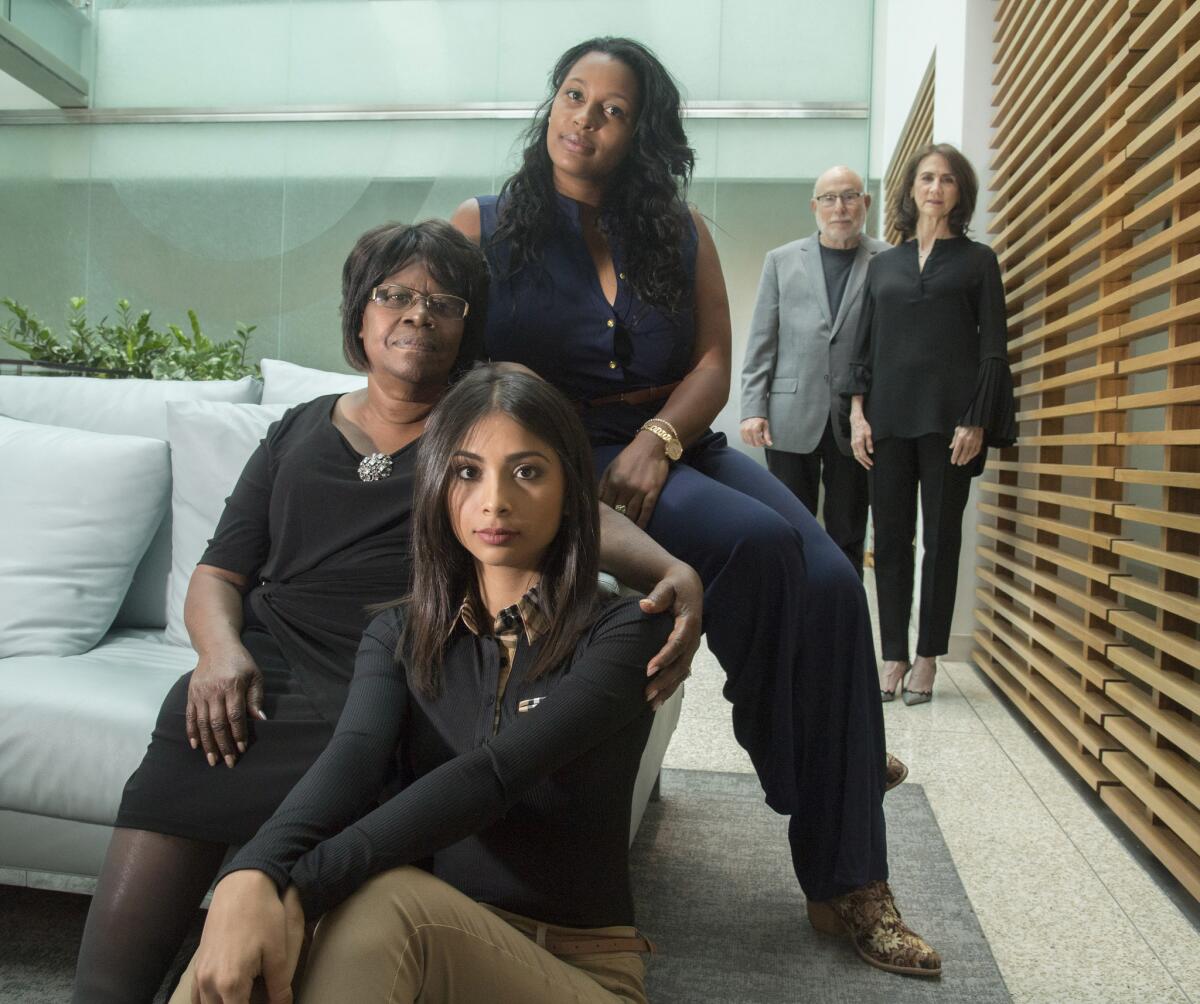This L.A. mom has taken in over 1,000 foster kids. Now she leads HBO’s ‘Foster’ documentary

L.A. Times Today airs Monday through Friday at 7 p.m. and 10 p.m. on Spectrum News 1.
- Share via
Every two weeks, at about 2 or 3 a.m., newborns were dropped off at Earcylene Beavers’ Los Angeles home. Some didn’t have bottles. Most didn’t have clothes, just swaddled in light blankets.
For 13 years, Beavers cared for babies in 15-day intervals, after emergency social workers separated them at birth from their parents, often due to drug exposure. Maintaining two cribs in her bedroom, she sometimes cared for two at a time, all while working full time.
“When I would go to church, people would say, ‘Let me see your baby today. Let me see which baby you got,’ ” she told The Times.
“Sometimes I would call my sitter that morning and say, ‘I got a baby last night. I’m dropping it off to you, and I’ll be back to pick her up after work. Any problems, call me.’ ”
Beavers’ story is one of five from the Los Angeles County Department of Children and Family Services featured in the HBO documentary “Foster,” premiering Tuesday during National Foster Care Month.
Ten years in the making, “Foster” reunites producer Deborah Oppenheimer and writer-director Mark Jonathan Harris, who worked on 2000’s Academy Award-winning “Into the Arms of Strangers: Stories of the Kindertransport.”
Their new film puts a spotlight on the strengths and weaknesses of the system in L.A. County, the largest county child welfare agency in the country.

REVIEW: ‘Foster’ takes a dramatic look inside L.A.’s complicated foster care system »
Beavers, dubbed “Mom USA” by her kids, is one of the successes.
She transitioned to long-term foster parenting about 15 years ago, after saying goodbye to newborns became too painful.
“It would hurt my heart. I cried so much over babies leaving me, and I said, ‘I can’t do this no more,’” she recalled.
Over the course of three decades, she has welcomed over 1,000 foster children into her home — even legally adopting three and becoming several others’ legal guardians.
RELATED: Which documentaries have a shot at breaking out at the summer box office? »
In the film, viewers also see the darker side of newborns entering the system, through the eyes of Kris’Lyn. She was separated from her parents moments after her birth once cocaine was found in her body.
Kris’Lyn is later placed into the care of her father, Chris. Her mother, Raeanne, fights to maintain her sobriety and earn back her parental rights. At one point, she dropped out of filming.
“I was devastated,” said Oppenheimer, adding that the film’s primary team met with a professor of social work to talk them through vicarious trauma and setting boundaries.
One of the most heartbreaking moments of “Foster” is when we watch Kris’Lyn experience a seizure on camera. Her small face freezes, staring into space. The cameras then capture a hospital test to determine how the cocaine exposure may have affected her development.
The documentary also follows Mary Montoya, now a young adult, who was exposed to drugs as a baby. She is joined by Dasani, a foster teen on probation, and Jessica Chandler, a former foster youth who navigated juvenile hall and a teen pregnancy before becoming a social worker.
Montoya, Chandler and Beavers spoke with The Times about having their lives captured on film. The following interview has been edited for length and clarity.
What was your initial reaction when you were approached for this documentary?
Montoya: At first I was very hesitant. Like, “What if I’m not enough? What if I’m not an accurate representation of other youth in the system?”
Beavers: I was thinking, “Oh, my God, really? Me and my kids?” We were excited about doing it.
Chandler: I was a little concerned about what the goal would be of the film. Would it just reinforce negative stereotypes? I was very excited to learn that the film was going to be an opportunity to show people where they can participate — day-to-day interactions with people that have transformed, at least for me, our trajectory.
Jessica, in the film, you reunite with someone who was instrumental in your life: your nurse Dojai, who through a nurse-family partnership guided you through your first pregnancy. What do you remember about that time and how did it feel seeing her again?
Chandler: Well, my son — who I wanted to hit or I wanted to give up on ... hearing [Dojai] say, “Hey, it’s OK to take a break and walk into the other room and close the door.” I was 19 years old and freaking out. I never told her thank you. I never got to tell her that her voice was so powerful in my life. So to be able to thank her [meant a lot to me].
Mrs. Beavers, we learn that you and your husband at the time experienced some infertility issues. That helped lead to your tenure as a foster parent. Tell me about taking that leap of faith.
Beavers: I wasn’t a foster kid, but it was almost like I came up in a foster home. I wanted to give them what they didn’t get in life by their biological parents. When they came to me, it was like, you’re not in a foster home. You’re in a family.
What’s it like to reflect on your past experiences, especially after seeing aspects of your life on-screen?
Chandler: Everyone told me like around 21, I’d probably be dead — many people, especially when I was in the group homes or juvenile hall. My dad told me that everyone had a purpose. He used to take us to Skid Row and show us the homeless people and say if we didn’t do good in school, that’s how we would end up. I thought that that was actually my purpose — that people were going to point at me and say, “Hey, you don’t want to be like her.”
That was like the furthest I had ever seen myself in life. I’ve been a social worker for four years now, going on five. It’s been really surreal.
How do you feel about others seeing the film, especially some of the family you discuss in it?
Montoya: I haven’t talked to my mom about it. [In the film, Montoya opens up about her mother’s abuse.] I’m a little scared of my mom seeing it, if she does.
Now I know a little bit more about my mom’s story and what she struggled with, why she was the way she was with me. We had a really long talk and I finally confessed to her all that I had been feeling. What if she sees the way I spoke about her then and it changes where we are kind of now?
Beavers: Watching it, I cried, along with the other kids, because it wasn’t like I’m looking at some actor. I’m looking at myself. It was serious. That was me. That’s who I am.
How do you feel today, reflecting on how far you’ve come?
Chandler: I was able to create a future for myself, become an advocate and feel empowered. For me, it was like my responsibility to give back and to bleed in that way, because I feel like I did bleed, emotionally, for this. I’m hoping that I can give other foster youth a second chance, for people to take a second look at them.
Beavers: I’m doing what I want to do. My kids are happy. I got God in my life. These kids fill a void. Me and my husband separated about 10 or 15 years ago, and I’m good. I haven’t missed a beat.
What do you hope people take away from this film?
Chandler: Only allies can really disrupt the cycle and intervene. The people who are in it, living in it and surviving, they aren’t able to disrupt. I hope the larger society takes a closer look at who we are as people and maybe see the potential.
Beavers: I want to recruit other foster parents, and I want the [current] foster parents to be more involved with the kids. I know sometimes it’s hard, but you gotta be strong. Love them to the point that you can say, “You know what? I know you didn’t mean it. I know you’re scared. I know you’re hurt. But we’re going to work through this together.”
Montoya: I just hope one girl out there [who is] exiting the system of foster care and feels terrified of what’s coming next will see that’s OK. That’s not just something that foster youth experience. It’s something that every teenager transitioning to adulthood experiences. And they’re not alone.

More to Read
The biggest entertainment stories
Get our big stories about Hollywood, film, television, music, arts, culture and more right in your inbox as soon as they publish.
You may occasionally receive promotional content from the Los Angeles Times.











